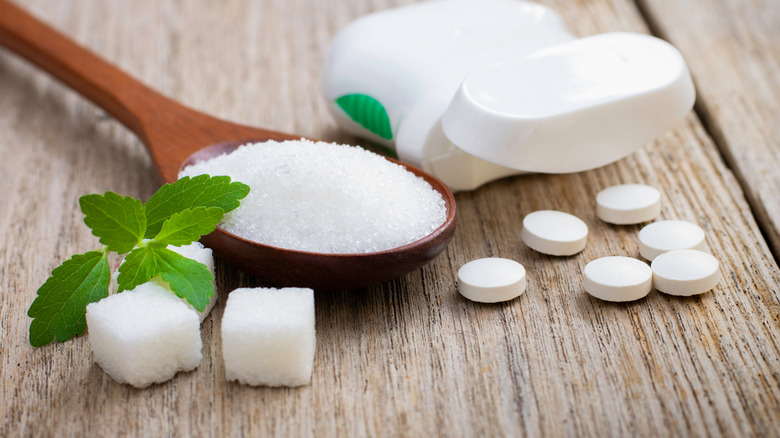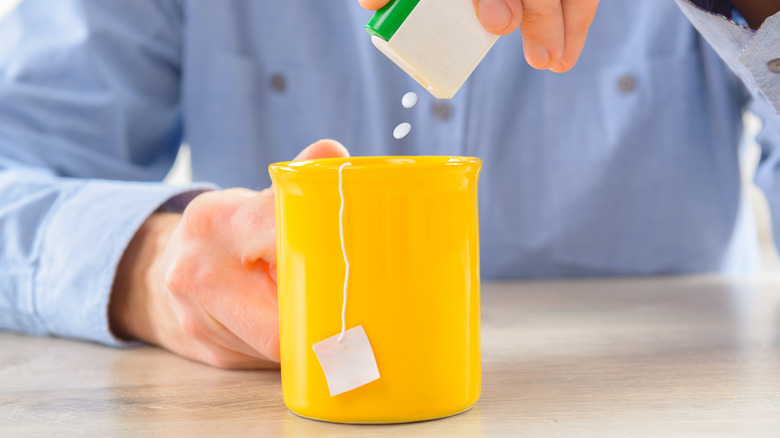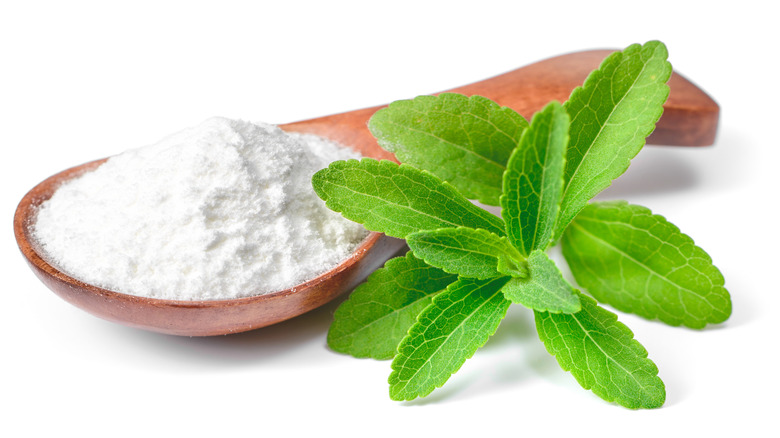Truvia Vs. Stevia: What's The Healthier Sugar Alternative?
Indulging in sugary delights, such as ice cream, cakes, and chocolates, is a pleasurable experience for many people. Unfortunately, research has consistently shown that sugar is not good for your health. Per a study published in 2014 in JAMA Internal Medicine, out of a total of 30,000 people, those who consumed more than 17% of calories from added sugar each day were more prone to developing and dying from cardiovascular diseases.
Americans, on average, consume 17 spoons of sugar per day, as opposed to the recommended daily allowance of 12 spoons per day. Since so many things contain sugar — including bread, milk, vegetables, fruits, ketchup, and beverages — we often end up consuming more than our bodies need (via WebMD). As a result of this excessive sugar intake, we develop different health conditions or diseases. Dr. Frank Hu, professor of nutrition at the Harvard T.H. Chan School of Public Health, says that the intake of added sugar can not only make people gain weight and develop diabetes, but it can have other detrimental effects on health, too.
"The effects of added sugar intake — higher blood pressure, inflammation, weight gain, diabetes, and fatty liver disease — are all linked to an increased risk for heart attack and stroke," Dr. Hu told Harvard Health Publishing.
Since there is growing awareness about the dangers of excessive sugar intake, many people have started looking for other options. Two popular choices are Truvia and Stevia. Which is healthier?
The difference between Truvia and Stevia
Among many natural sweeteners available in the market, two names are quite popular: Truvia and Stevia. Whether you are trying to cut down on your sugar intake or are on a keto or low-carb diet, both sweeteners could come in handy, especially if you have a sweet tooth. However, before deciding which one you would like to opt for, it's important to know the differences between the two.
Stevia is a natural sweetener made by turning the leaves of a plant — Stevia rebaudiana — into powdered or liquified form. Stevia leaves comprise two sweet compounds, stevioside and rebaudioside A. Per Healthline, the U.S. Food and Drug Administration (FDA) has only approved rebaudioside A — the highly refined form of the plant — as a food additive.
On the other hand, Truvia is a sweetener jointly developed by The Coca-Cola Company and Cargill, Inc. Unlike Stevia, which only consists of Rebaudioside A, Truvia is made up of three ingredients, including a type of sugar alcohol called erythritol, unspecified natural flavors, and Rebaudioside A (via Healthline). It is often confused with Stevia, but the two are different products.
Are Truvia and Stevia safe?
According to Healthline, the FDA considers the less refined form of Stevia to be harmful to human organs, including the liver, heart, and reproductive organs. Hence, the authority has only approved the aforementioned Rebaudioside A. On the other hand, there is a consensus among dieticians that Stevia is safe, but it should be consumed in moderation. As per the recommendation of the World Health Organization's Expert Committee on Food Additives, you should avoid consuming more than 4 milligrams (mg) of Stevia per kilogram of your body weight (via Medical News Today).
On the other hand, Truvia, which has been approved by the FDA, contains 99.5% erythritol and only 0.5% Rebaudioside A, and therefore it is not a natural product (via Healthy Eaton). Since Erythritol is not broken down in the body, being a sugar alcohol, it does not contribute to weight gain. Nonetheless, it could have some side effects, including digestive problems such as diarrhea, cramps, gas, and bloating (via Meritage Medical Network).


